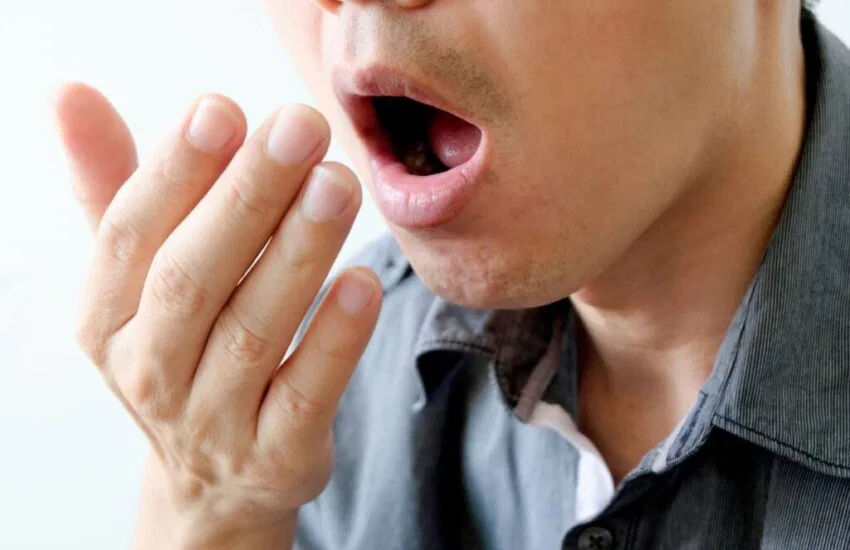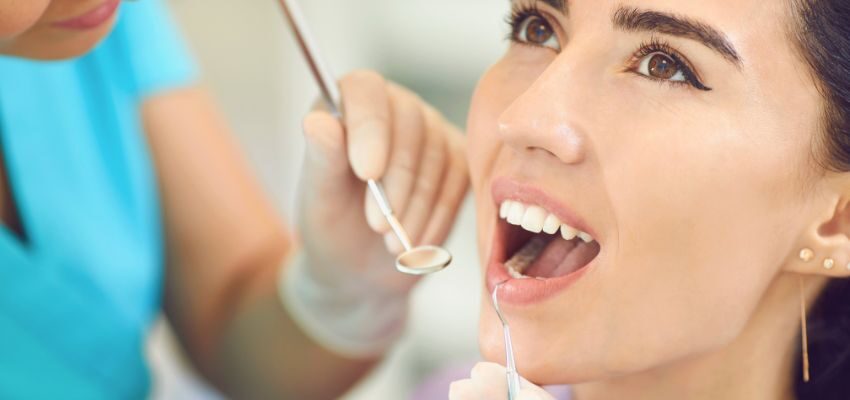Why Does My Breath Smell? Here’s What You Need To Know

Published September 11, 2025
Ever wondered, “Why does my breath smell?” That wave of self-consciousness can hit hard—whether it’s first thing in the morning or right before an important meeting. Bad breath is common, but understanding its causes and solutions can make all the difference.
In this article, we’ll explore the science of bad breath to help you understand not just its causes, but also what you can do about it. By making sense of the problem, you’ll be better prepared to stay fresh and confident in every conversation.
Understanding Halitosis (Bad Breath)
Halitosis, or persistent bad breath, goes beyond occasional odors from certain foods. It can be temporary or chronic, caused by chemical compounds released in the mouth and, sometimes, elsewhere in the body. Diet can contribute, but persistent bad breath may signal underlying health issues.
How Common Is It?
Bad breath affects millions worldwide. Most people have dealt with “morning breath” due to reduced saliva during sleep, allowing bacteria to grow. Stress, dieting, and dehydration can also cause bad breath, impacting social interactions and confidence.
What Causes Bad Breath?
Bad breath arises due to poor oral hygiene or underlying conditions.
Bacteria And Volatile Sulfur Compounds (VSCs)
Bad breath is typically caused by bacteria residing in your mouth. These microorganisms thrive on leftover food particles, dead cells, and proteins in your saliva. As they break down these substances, they release foul-smelling gases called volatile sulfur compounds (VSCs).
Common VSCs include hydrogen sulfide, with its “rotten egg” smell, and methyl mercaptan, both causing bad breath.
Poor Oral Hygiene
Neglecting proper brushing and flossing creates the ideal breeding ground for odor-causing bacteria. Plaque—a sticky bacterial film—accumulates on your teeth and gums, while food particles become lodged between teeth.
Additionally, a coating may develop on your tongue, all of which contribute to persistent bad breath. Gum disease, like gingivitis or periodontitis, is a major cause. Inflamed gums create deep pockets which become a breeding ground for bacteria.
Dry Mouth (Xerostomia)
Saliva is crucial for preserving oral health and overall well-being. It cleanses the mouth by flushing away food particles and neutralizing acids produced by plaque. However, when your mouth is dry—a condition known as xerostomia—this natural cleaning process becomes less effective.
Dry mouth is often caused by medications, mouth breathing, or consuming caffeine or alcohol. This is also why morning breath tends to be worse after a night of reduced saliva production during sleep.

Diet And Lifestyle Factors
Your breath’s freshness is deeply influenced by your diet and lifestyle choices. Garlic, onions, and strong spices contain oils that enter your bloodstream. These oils travel to your lungs and are released through your breath. Drinks like coffee and alcohol make it worse. They create an environment that enables bacterial growth.
High-protein or low-carb diets, like keto, can lead to a distinct type of bad breath as your body burns fat for energy. Smoking, too, is a major culprit—it not only leaves a lingering odor but also dries out your mouth, worsening the problem.
Tonsil Stones And ENT-Related Conditions
Bad breath isn’t always linked to your teeth—your tonsils can often be the culprit. Tonsil stones, or tonsilloliths, are small, hard deposits. They form in the crevices of your tonsils. Bacteria and debris get trapped, causing an unpleasant odor.
Other ear, nose, and throat (ENT) conditions can cause bad breath. These include sinusitis, postnasal drip, and tonsil infections. These conditions lead to the buildup of mucus and bacteria at the back of the throat, creating the perfect environment for odor to develop.
Medical And Systemic Causes
Bad breath can sometimes signal an underlying medical condition. For example, gastroesophageal reflux disease (GERD) can cause stomach acid to flow into the esophagus. This may produce a sour odor. Metabolic disorders, such as uncontrolled diabetes, can result in a noticeable “fruity” smell on the breath.
Chronic bad breath can also result from kidney or liver problems, respiratory infections, or gastrointestinal issues. Identifying these systemic causes is essential for addressing persistent halitosis effectively.
Identifying The Cause Of Bad Breath
Determining the root cause of bad breath is the first step. It’s key to solving the problem effectively.
How To Assess And Recognize A Potential Problem
Determining the freshness of your own breath isn’t always easy. A quick test is to lick the interior side of your wrist, allow it to dry for a moment, and then take a sniff. For a more accurate assessment, consider asking a family member or friend for honest feedback.
Additionally, if you frequently notice a persistent bad taste in your mouth, it could be an indicator that your breath may not be as fresh as you’d like.

Professional Evaluation
If improved hygiene and self-checks don’t resolve the issue, it’s time to consult a professional. A dentist can perform a full examination. They can identify issues like cavities, gum disease, plaque buildup, or other oral health problems.
If no dental issues are found, you may be referred to an ENT specialist. They can check for tonsil stones or sinus issues. You may also be referred to your primary doctor to rule out other medical conditions.
Treatment And Prevention Strategies
Identifying the cause leads to fresher breath. With this knowledge, you can deal with the issue effectively.
Improve Oral Hygiene
Fresh breath starts with a strong oral hygiene routine. Here’s what to include:
- Brushing: Brush your teeth for up to two minutes, twice a day, to keep them clean and healthy.
- Flossing: Floss daily to get rid of food particles and plaque from those hard-to-reach spaces between your teeth.
- Tongue cleaning: Use a brush or tongue scraper to gently remove bacteria buildup on your tongue.
- Regular check-ups: Schedule routine dental visits to undergo professional cleanings and thorough exams.
Lifestyle Modifications
- Maintaining proper hydration throughout the day to prevent dry mouth and keep your breath fresh.
- Reduce foods and drinks that contribute to unpleasant breath.
- Stop smoking to enhance your breath and boost your overall health.
- Use sugar-free gum or mints with xylitol to stimulate saliva and maintain freshness.
Use Mouthwash And Probiotics Wisely
Mouthwash can offer a quick boost of freshness, but not all formulas are equally effective. Choose alcohol-free rinses with zinc for lasting benefits. Zinc helps neutralize VSCs that cause bad breath. Oral probiotics may also help by introducing beneficial bacteria into the mouth. These beneficial bacteria support a healthy oral microbiome and can reduce odor-causing bacteria, thereby helping to control bad breath.
Bionaze is a probiotic blend with BLIS K12™ (Streptococcus salivarius K12) and BL-04™ (Bifidobacterium Lactis BL-04). These strains support ear, nose, and throat health as well as digestion and immunity. Using Bionaze may help maintain fresh breath and support wellness.
Treat Underlying Medical Conditions
If a health condition is the cause of your bad breath, addressing the underlying issue is essential. This could mean working with your dentist to treat gum disease. It might involve seeking care for sinus infections. Managing GERD may require medication and dietary changes. You may also need to work with your doctor to control conditions like diabetes.
Frequently Asked Questions
Why does my breath smell like eggs or sulfur?
The smell of eggs or sulfur on your breath is typically caused by VSCs. These are produced by anaerobic bacteria in your mouth as they break down proteins. This unpleasant odor is often a sign that your oral hygiene routine might need some improvement.
Can your diet cause bad breath?
Absolutely. Certain ingredients, such as onions and garlic, might lead to temporary bad breath. Additionally, high-protein or low-carb diets, like keto, may cause a noticeable odor due to the body entering ketosis.
Could bad breath indicate a serious health issue?
In most cases, bad breath stems from poor oral hygiene. However, lingering bad breath may be a warning sign of an underlying health concern. A fruity breath odor may indicate diabetic ketoacidosis, while an ammonia-like scent could signal kidney failure.
Can probiotics help with bad breath?
They might. Oral probiotics introduce good or “beneficial” bacteria into your mouth to help reduce odor-causing bacteria. While the results are promising, probiotics are most effective when paired with good oral hygiene practices.
When should you visit a dentist or doctor?
If better oral hygiene hasn’t resolved your bad breath, it’s time to see a dentist. They can identify or rule out any dental or oral health issues. If no issues are found, consult a doctor to check for underlying causes like ENT or systemic conditions.
Why Choose Bionaze
Bionaze is a science-backed oral probiotic designed to support fresh breath and upper respiratory health. It features two patented strains—BLIS K12™ (Streptococcus salivarius K12) and BL-04™ (Bifidobacterium Lactis BL-04)—that work together to combat bad breath, balance the oral microbiome, and boost ENT and digestive health.
BLIS K12™ helps reduce halitosis and respiratory infections, while BL-04™ supports digestion and immunity. Delivered as convenient lozenges, Bionaze targets your mouth and throat for maximum benefit. Ready to breathe easier, feel healthier, and enjoy fresher breath? Give Bionaze a try today and experience the difference.

Goodbye Bad Breath, Hello Confidence
Bad breath is a common issue, but it’s entirely manageable. For many, the key to fresher breath lies in improving oral hygiene habits—regular brushing, flossing, and cleaning the tongue. Addressing bad breath may require dietary changes or consulting a dentist or doctor to treat underlying conditions. By pinpointing the root cause and taking proactive steps, you can effectively resolve the issue. Prioritize your oral health today and embrace the confidence of a fresh, clean smile.
For extra support, try Bionaze—a blend of clinically researched and beneficial probiotics. Bionaze is formulated to support oral, ear, nose, and throat health while aiding digestion and immunity.
Benefit From The Latest Advancements In Probiotic Science With Bionaze
Bionaze is a proprietary blend of probiotics proven to promote ear, nose, and throat health, improve digestion, and support your immune system. The active ingredients BLIS K12, and BL-04 are considered among the best probiotics according to science.
Get 25% Off Your First Order when you use BIO25 at checkout!

This Content Has Been Reviewed For Factual Accuracy
This content has undergone thorough fact-checking by our team of internal experts. Learn more about the meticulous editorial standard for our website here.
ADVERTISEMENT

About The Author
Hi, I’m Corinne Grace, a proud nursing graduate from Riverside College with a flair for writing. I specialize in health and wellness topics, using my educational background to weave informative and attention-grabbing articles that appeal to a wide variety of readers.




